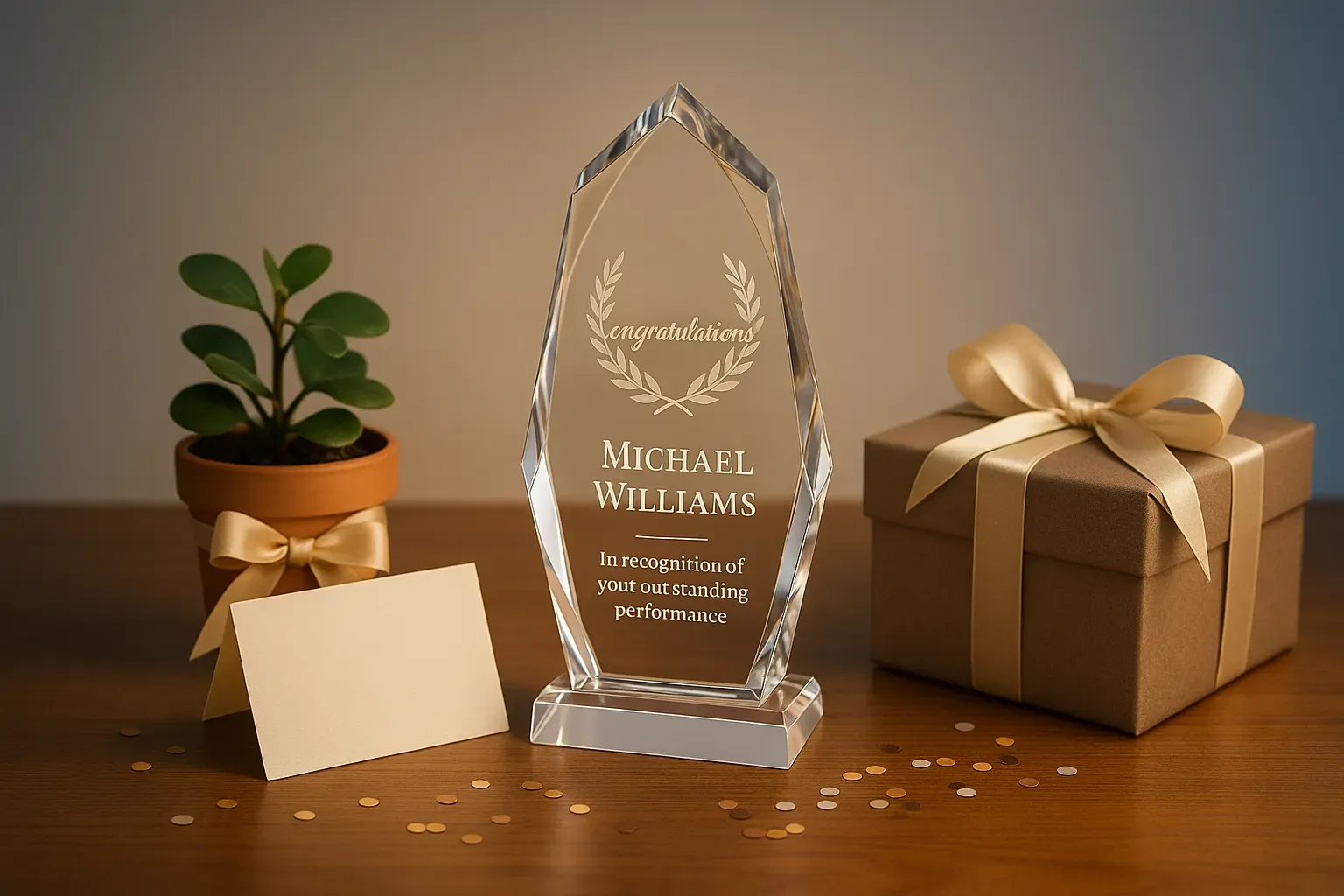Recognition experts reveal that personalized acknowledgment creates stronger workplace connections than generic awards programs. Effective employee recognition strategies focus on celebrating the individual behind the role, not just their professional accomplishments. This comprehensive guide shares practical approaches to meaningful recognition that resonate with employees on a personal level while building a culture of authentic appreciation.
- Track Personal Preferences Through HRIS System
- Tailor Recognition to Personal Dreams
- Align Recognition With Individual Growth Aspirations
- Win Wall Celebrates Both Professional and Personal
- Quiet, Authentic Moments Beat Staged Recognition
- Experience-Based Gifts Create Shared Appreciation Culture
- Celebrate the Person Behind the Role
- Replace Generic Awards With Frequent Personal Shoutouts
- Build Emotional Armor With Praise Journals
- Transform Achievements Into Teaching Resources
- Acknowledge Specific Behaviors That Help Others
- Combine Public Recognition With Heartfelt Notes
- Personalized Vacation Rewards Drive Team Motivation
Track Personal Preferences Through HRIS System
Our core philosophy in recognition shifted from a transactional model like a generic annual bonus to an experiential and value-aligned one, focusing on understanding and celebrating the unique motivators and personal lives of our people. The major change was embedding a simple system into our HRIS that allows managers to track non-work-related preferences, like an employee’s favorite charity, hobby, or desired skill development. This moves recognition from a “one-size-fits-all” gift card to something deeply personal and memorable.
This personalization is expressed in two ways: first, the nature of the reward and second, the style of recognition. For an employee who is passionate about sustainability, a significant achievement might be rewarded with a donation in their name to an environmental non-profit, alongside an extra paid day off. For another who is focused on career growth, the reward might be funding for a specific, high-cost external certification or a coveted mentorship session with a C-level executive. The style of recognition is also tailored: some prefer a quiet, handwritten note and private lunch, while others thrive on a public, company-wide announcement and a team celebration. We train managers to know the difference.
An impactful example involved a Senior Engineer, Sarah, who successfully resolved a complex, year-long technical debt problem that was quietly draining team efficiency. Instead of a standard monetary bonus, her manager, knowing Sarah was a passionate amateur baker and had recently been talking about starting a side business, leveraged her achievement. Sarah’s recognition was a week-long, paid sabbatical combined with a fully-funded intensive master baking class at a premier local culinary institute. The impact was profound: she felt deeply seen and valued not just for the code she wrote, but for her personal aspirations. This recognition acted as a powerful motivator, leading her to speak highly of our culture and commit to the company for the long term. The most valuable lesson was that investing in an employee’s personal joy or growth interest often generates a higher return on engagement and loyalty than a purely financial reward.

Tailor Recognition to Personal Dreams
As a senior leader in an employee loyalty program company, I’ve learned that recognition only feels genuine when it connects to who the person is—not just what they’ve done. People are motivated by different things, so we strive to celebrate their achievements in ways that matter to them, rather than in a one-size-fits-all manner.
For example, some employees feel most proud when their efforts are shared publicly with the whole team, while others prefer a quiet “thank you” and a personal note. Some love gift cards or experiences they can share with family, while others value professional development opportunities, like training or mentoring. By taking time to know each employee’s preferences, we can make the recognition feel more thoughtful and genuine.
One moment that stood out for me was when we recognized a long-time team member who had gone above and beyond during a big client project. Instead of just giving her a plaque or bonus, we learned that she had always dreamed of attending a special leadership workshop abroad. We worked with her manager and arranged for her to attend that program, covering her travel and expenses. Not only did she feel deeply valued, but she also came back energized, sharing new skills and ideas with the entire team.
That experience reminded me that recognition is not just about a reward—it’s about showing someone that we see them as a person and that we care about what’s important to them. When recognition is personal, it becomes more than just a thank you. It strengthens trust, loyalty, and motivation in ways that last far beyond the moment.

Align Recognition With Individual Growth Aspirations
At Invensis Technologies, recognition has always been approached in a way that aligns with what truly matters to each individual. Instead of standard awards, effort is put into understanding an employee’s personal motivators—whether it’s career growth, family, or passion projects—and tailoring recognition around that. For example, when a project manager successfully led a complex digital transformation initiative ahead of schedule, the acknowledgment went beyond a simple appreciation note. Along with a public celebration, a personalized mentorship opportunity with senior leadership was offered, knowing that professional development was something highly valued. This not only reinforced the impact of their contribution but also created a sense of long-term investment in their career growth. Such recognition becomes far more meaningful when it resonates with personal aspirations, and it has consistently helped strengthen both morale and loyalty within the organization.

Win Wall Celebrates Both Professional and Personal
We implemented a “win wall” in our office where team members can publicly display both professional and personal achievements. This approach allows each employee to receive recognition in a way that acknowledges their unique contributions and milestones that matter most to them personally. Our team members have responded enthusiastically to this personalized recognition system, with many noting that having their accomplishments visibly celebrated by colleagues has significantly boosted their sense of belonging and motivation. The win wall has become an important part of our company culture, creating a space where individual successes, both in and outside of work, are valued and celebrated collectively.

Quiet, Authentic Moments Beat Staged Recognition
Corporate recognition has become wallpaper; predictable plaques, obligatory LinkedIn posts, and pizza parties that feel like guilt offerings. Nobody’s motivated by a gift card stapled to a thank you note.
At Franzy, we do it differently. When someone goes above and beyond, like reviving a franchise relationship on the verge of collapse, we skip the hollow applause slide. I’d rather show up quietly, their favorite drink in hand, and tell them exactly how their grit just safeguarded the business. It’s understated, personal, and specific.
Recognition doesn’t have to be loud or expensive; it has to be genuine. The valuable moments aren’t staged photo ops; they’re the unexpected, human ones that make people think, ‘They truly see me.’ That’s how you create a team willing to go all-in on the mission, without ever asking.

Experience-Based Gifts Create Shared Appreciation Culture
I found that traditional recognition often falls short in creating meaningful moments for employees, so we implemented personalized Tinggly gift cards that allow team members to select experiences aligned with their individual interests. This approach transformed our holiday gift-giving by enabling employees to choose activities ranging from helicopter rides to private chef dinners based on their personal preferences. The impact was remarkable as employees enthusiastically shared their selected experiences with colleagues, creating a culture of appreciation that felt genuinely personal rather than corporate.

Celebrate the Person Behind the Role
One of the ways we’ve made employee recognition more meaningful is by taking the time to personalize it around who the person actually is, not just what they do. For work anniversaries and birthdays, we don’t just say “happy birthday” or “congrats on another year” but use it to celebrate the person behind the role.
We’ll gather messages from the team, including quick notes, inside jokes, shared memories, or shoutouts that highlight specific contributions they’ve made, both professionally and personally. Sometimes it’s about a project they nailed. Other times, it’s about how they bring calm to chaos or always know the best lunch spots. It doesn’t have to be work-related to be meaningful. The point is to make them feel seen.

Replace Generic Awards With Frequent Personal Shoutouts
We tend to not do things like “employee of the month” simply because those kinds of employee recognition often don’t feel very personal or genuine. Instead, we focus on giving recognition often and individually, for all kinds of different things – not just direct business-related success. I’ll send individual messages, or we’ll give personal shoutouts during meetings, for example.

Build Emotional Armor With Praise Journals
Every month, we ask: “Whose work did you admire this sprint?” It’s a Slack ritual, but we document and archive everything into a “praise journal.” Employees can revisit that log during performance reviews or rough weeks. Seeing their name in others’ gratitude notes creates resilience and pride. Recognition becomes emotional armor for hard seasons.
One social media manager bookmarked her praise thread and rereads it when campaigns flop. She told me it keeps her grounded in impact, not just outcomes. Recognition isn’t always a moment; it can be a memory bank. That’s how we make praise last longer than performance highs. Consistency matters more than grandiosity in emotional culture.

Transform Achievements Into Teaching Resources
Employee recognition becomes most impactful when it connects to individual talents and specific achievements rather than basic approval statements. The recognition process at my agency focuses on acknowledging team members who introduce creative risks and innovative solutions to their projects.
The developer on my team successfully resolved an SEO problem which had been challenging our team for multiple weeks. I created a case study about his solution which I presented to our clients and prospects as a way to express my gratitude. His work evolved into a teaching resource which brought him greater satisfaction than any gift card could have provided because he knew his efforts educated others.

Acknowledge Specific Behaviors That Help Others
I believe personalized recognition should focus on the unique strengths and contributions each employee brings to the table. In one instance, rather than simply acknowledging that a team member met an important deadline, I specifically recognized how they achieved it by helping others stay unblocked throughout the project. This personalized approach to recognition resonated deeply with the employee and had the additional benefit of reinforcing collaborative behaviors across the entire team. We saw a noticeable increase in peer support following this recognition, demonstrating how targeted appreciation can shape organizational culture.

Combine Public Recognition With Heartfelt Notes
At our firm, we believe that recognition means more when it’s both public and personal. We regularly highlight employee achievements on our social media platforms to give them the public recognition they deserve. Still, we also celebrate them within the firm in more personal ways—like handwritten notes of gratitude and appreciation.
For example, if a paralegal goes above and beyond to support a client during a challenging case, we might feature their dedication on our social media. I would write a personal note thanking them for their work, compassion, and patience. As a leader, I know how much it means to my employees to know their efforts are seen and valued on a deeper level. That’s why we make recognition a priority. It’s not just about acknowledging the work; it’s also about honoring the person behind it.

Personalized Vacation Rewards Drive Team Motivation
Our company implemented a ‘Kudos’ program to recognize outstanding employee achievements throughout the year. The program culminates in a year-end lottery where the winner receives a monetary vacation gift along with dedicated travel agent support. What makes this recognition truly meaningful is that employees can plan their own vacation rather than receiving a standard corporate gift, allowing the reward to reflect their personal interests and preferences. This personalized approach to recognition has significantly increased motivation across our teams—everyone wants to take a vacation!


